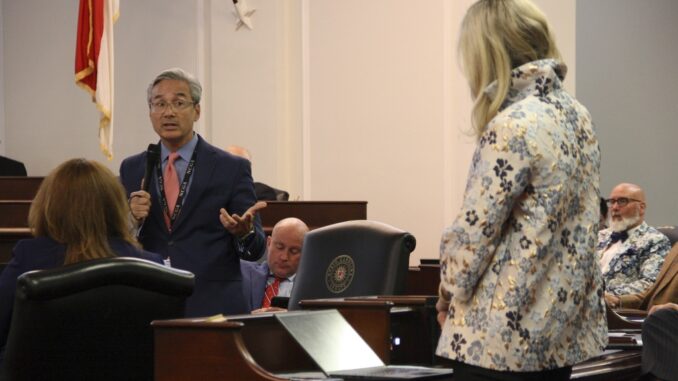
RALEIGH — The North Carolina Senate last week approved an additional $463.5 million over the next two years to clear the Opportunity Scholarship Program’s 54,800-deep waitlist.
House Speaker Tim Moore (R-Kings Mountain) said before the start of the short session that around $300 million in additional funds may be considered.
Through a preferred committee substitute (PCS) bill, $248 million in nonrecurring are slated for the upcoming school year and $215.5 million in recurring funds are included in the 2025-26 school year. The PCS establishes an “education reserve” as part of the General Fund and directs the UNC Board of Governors to allocate the money to the N.C. Education Assistance Authority (NCSEAA) for the scholarships.
The Opportunity Scholarship program (OSP) was created by the General Assembly in 2013 and awards are given on a sliding scale based on a family’s household income. Lower-income families and returning grant recipients receive priority. The awards can be used to pay tuition and fees to attend the eligible private school chosen by a family.
Democratic Sens. Natasha Marcus (Mecklenburg) and Gladys Robinson (Guilford) criticized the funding expansion.
Marcus called the funds a “handout” for wealthy families and added, “Seventy percent of the people you’re rushing to help earn more than $115,000 (annually).”
Sen. Michael Lee (R-New Hanover) responded that those families might be unable to afford private tuition.
“A family where the breadwinners in the family are making $115,000 a year is not going to have that opportunity, or a single mom with three kids,” said Lee. “They have the right to be able to do that. We as a state should do that.”
Robinson complained that taxpayer money shouldn’t go to private schools but instead fully fund public schools.
“Even with the appropriation this year,” Lee said in response. “We’re still looking at an appropriation for Opportunity Scholarships of about 3% of the overall education budget, and just under 4.5% of the K-12 budget. As an overall percentage of the education budget, it’s incredibly small.”
At last check, of the 72,000 new applicants this year, Tier 1 (maximum scholarship amount of $7,468) had 13,680 applicants, Tier 2 (grants up to $6,722) had 18,720, Tier 3 (grants up to $4,480) had 26,640, and Tier 4 had 12,960 (grants up to $3,360).
Lee also fielded criticisms of additional funding from Sen. Mary Wills Bode (D-Wake). Bode herself graduated from Cardinal Gibbons High School in 2006, a private religious school. The school’s website promotes OSP awards as a means of assistance in paying the school’s tuition.
The state allocated a total of $152.1 million for the OSP, Education Student Accounts Program and the Disabilities Grant combined in Fiscal Year 2021-22. The state’s overall K-12 education spending that year was more than $16.7 billion — meaning the allotment for the three programs was just 0.9% of that total.
Robinson, along with Guilford Democrat Sen. Michael Garrett, has been sending invasive and threatening letters to OSP schools in recent months. Both lawmakers have used their position on an oversight committee to claim the authority to send the letters; individual members, however, do not have that power under statute.
The Senate’s PCS approval follows an April 6 press release by the NCSEAA announcing OSP award offers were sent to 2,294 new students in Award Tier 2, but the current funding wasn’t enough to cover all students in that tier nor the third or fourth tiers.
Tier 2 families have until May 17 to accept or decline these offers through their “MyPortal” account. Additionally, 958 new students were offered Education Student Account (ESA+) Scholarships for children with disabilities.
Families who need more information should visit the Opportunity Scholarship or ESA+ pages on the NCSEAA website or call 855-330- 3955 for assistance.
On March 29, the NCSEAA announced that 13,511 new students have been offered Opportunity Scholarships for the 2024-25 school year out of approximately 72,000 applicants.
The PCS providing additional funding trended on the social media platform X, and among the posts were one by Cooper and another from noted national school choice advocate Corey DeAngelis.
“The first bill the Republican legislature is passing takes taxpayer money from public schools and gives it to the wealthy for private school vouchers,” Cooper wrote. “This is their #1 priority? It hurts public schools, especially rural. Instead give teachers the 8.5% raise I requested.”
The X post was labeled with an “RC,” denoting Cooper made the post personally.
DeAngelis responded to the governor’s post by writing, “You sent your kid to private school, you hypocrite.”
Cooper was the subject of national criticism last year after using his official website to declare a “state of emergency” over the expansion of the programs in the state while he had sent one of his children to the same school Bode attended; Saint Mary’s School in Raleigh.
This article has been updated to correct Bode’s high school to Cardinal Gibbons. A previous version stated she attended St. Mary’s.


